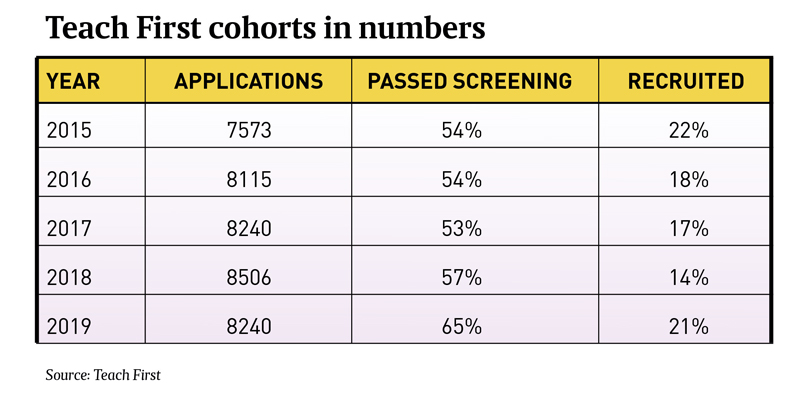The education charity Teach First has recruited a record cohort of trainee teachers after almost two in three passed its screening process.
This summer, 1,735 trainees will join the scheme, which places high-flying graduates who might not have considered teaching in schools serving disadvantaged communities.
If the next prime minister wants the country to thrive, we need serious action
For the 2019 intake, 65 per cent of applicants passed the charity’s initial screening, the highest level ever, and 21 per cent went on to get a place.
The cohort is Teach First’s largest to date and is just 15 trainees shy of the 1,750 target set by the government in its £39 million funding contract. The boom this year reverses a three-year slump which saw cohort numbers drop as low as 1,259 last year.
It comes after Schools Week revealed how the charity was sharpening its focus on the teacher recruitment elements of its business, amid doubts over the future of its government funding. Several non-teaching-related programmes were ditched, putting a number of jobs at risk.
Data obtained by this newspaper shows that of 8,240 applicants for this year, 65 per cent passed the charity’s blind screening process, which is based solely on “academic qualifications and long standing competencies”. Applicants need at least a 2:2 degree and certain A-level and GCSE qualifications to pass the screening and go through to the next stage.
Although the proportion of applicants gaining a Teach First place is now back to around the level it was in 2015, the proportion getting through initial screening has risen substantially.

Last year, 57 per cent of applicants passed, and in 2017 just 53 per cent made it through.
However, Teach First insists its screening process has not changed, and puts the increase down it receiving more high-quality applications as a result of other changes to its recruitment process.
The charity says it redoubled its efforts to highlight “the huge rewards that come with joining the profession” and targeted advertising and social media at trainees in specific subjects and “from a more diverse pool”.
Teach First also claims to have “re-engineered each stage of their recruitment process to improve the overall applicant experience, increasing feedback and face-to-face assessment of candidate potential”.
“While there was no magic bullet, the carefully targeted changes meant the charity saw more high quality applicants than ever before in their sixteen year history and more who stayed in the application pipeline all the way through,” a spokesperson said.
Announcing the news today, Teach First chief executive Russell Hobby called for “serious action” from whoever becomes the next prime minister to tackle the teacher recruitment and retention crisis.

Hobby said he was “delighted” the charity had “bucked trends” with its record-breaking cohort, “but with pupil numbers rapidly rising, this isn’t ‘job done’”.
“We’re striving to make sure our teachers of the future truly reflect the diversity of the communities they serve. We know there are more people out there from all walks of life who could build a rewarding career in teaching and we’re determined to find them.
“If the next prime minister wants the country to thrive, we need serious action. This means pledging to increase school funding, protect the pupil premium, and urgently address teacher starting salaries and workload. If we get this right, we can change the tide on teacher recruitment and retention, to change the direction of children’s lives.”
As well as being the charity’s largest, this year’s cohort is also its “most diverse”, Teach First said.
Black, Asian and minority ethnic teachers make up 22 per cent of the cohort, up from 15 per cent in 2015. The proportion of LGBT+ trainees has also increased from 6 to 12 per cent over the same period, while the number with disabilities has increased from 9 to 17 per cent.
This year, 30 per cent of Teach First trainees changed careers to join the scheme, up from 22 per cent in 2015. The charity has also announced increases in its numbers of STEM and modern foreign language trainees.








Pity they won’t know anything about education, but then neither do their MAT executive employers. This is especially important in fields like education where genuine, evidence-based research so often leads to counter-intuitive conclusions. It’s a bit like recruiting marine architects that are ignorant of the profoundly counter-intuitive Principle of Archimedes and then being surprised when their ships sink. See
https://rogertitcombelearningmatters.wordpress.com/2019/04/14/whats-not-to-like/
More gross generalisation and insults from the man who says “I am not uniformly critical of Academies”.
So first off, dismissing thousands of trainees as not knowing anything about education, despite not having the first idea where anyone of them come from and their backgrounds.
Then doubling down on the evidence-free insults, their potential “MAT executive employers” also know nothing about education. Almost all MAT CEOs used to be headteachers at local authority schools so presumably back then they knew a little bit about education – did they lose all this knowledge and experience the moment their schools became academies?
You’ve accused me of being a troll on other threads because I dared to question the basis of your arguments. Unless you have anything which properly supports such gross insults to people who have decided to work with children I would respectfully suggest that this type of behaviour rather more fits the bill …
Here we go again. I will simply draw your attention to the fact that in Finland all teachers must have a Masters degree in Education, To become a teacher through ‘Teach First’ or to become an Academy MAT executive it is not necessary to have studied the history, theory and practice of education at all. The contribution of Academic University Schools of Education to teacher training in England has collapsed. This is having the predictable negative consequences that I have previously pointed out. I will not waste my time or that of readers by replying further to you on this thread.
No, sorry, you didn’t point out that in Finland all teachers must have a Masters degree in Education, you said that the Teach First trainees and their MAT executive employers “won’t know anything about education”.
Pointing out that it would be better for teachers to have a Masters degree in Education is obvious. It would also be better if they spent twice as long in training, were paid three times as much as they are now, and were recognised properly by society for the incredibly important job they do. I doubt you’ll find many people on these message boards who disagree with that.
However the reality is we are in the midst of a teacher shortage and Teach First is one of the avenues being used to try to address this.
Could it be better? Of course it could. But insulting thousands of people out of hand doesn’t help.
This is definitely my last comment.
It’s no use improving recruitment if the NQTs are leaving teaching faster than Teach First can recruit them, which appears to be the case.
According to NfER, the retention rates of early career teachers are lower now than they were a few years ago. (Google it) Around 87 per cent of teachers who enter teaching remained in the profession at the end of their first year, which is a figure that hasn’t changed since 2010, until 2017 when it decreased to 85 per cent. Worse still, the three-year retention rate dropped from 80 per cent in 2011 to 73 per cent in 2017 and the five-year rate dropped from 73 per cent in 2011 to 67 per cent in 2017. This is despite huge bursaries, which have wasted £millions of taxpayers money.
https://www.theguardian.com/education/2019/apr/16/fifth-of-teachers-plan-to-leave-profession-within-two-years.
As Academy MATs have taken over more and more schools, so the crisis has grown. That the same Academy MATs are claiming to be upping the Teach First teacher training route that is failing to keep their trainees in the job does not suggest any grounds for optimism.
That may be your last comment, but it has nothing whatsoever to do with the point.
The point was, that seemingly with nothing to support your contention, you dismissed thousands of trainee teachers and people that work in MATs as not knowing anything about education. When challenged on this you pivoted and tried to talk about how things were better in Finland.
A bit like when you insulted Steve Garnett by telling him he didn’t know any better because he’d only worked in academies. When it was pointed out that he actually worked in an LA school you pivoted and started talking about other things. (https://schoolsweek.co.uk/i-am-a-classroom-teacher-and-i-want-isolation-booths/#comment-148887)
Whatever the merits, or demerits of Teach First, this reads as advertorial.
It’s news and analysis we come to Schools Week for, not press-release.
An organisation recruiting teachers and telling them as they do they’ll be able to get a better job elsewhere with their new leadership skills and the qualities they bring to the classroom. Great.
Teach First; Get a better-paid job later.
Teach First only recruits 5% of teachers but is more expensive than other routes into teaching. Retention is lower. (Source: NAO 2016). Yet this tiny proportion of teachers is constantly praised as being superior to teachers trained by other methods.
Teach First recruits teach from the outset, as do some trainees on school-based routes into teaching. This practice, whether TF or not, denies trainees access to education theory and practice. https://www.localschoolsnetwork.org.uk/2014/07/teaching-is-an-intellectual-activity-so-teachers-need-high-quality-training-to-do-the-job-properly
Given we have a teacher shortage, which I presume is universally acknowledged, how do we go about trying to address this?
I’ve seen a few people say that TeachFirst is more expensive and less successful with regards to retention, but I presume that it’s accepted that there are more teachers in place than there would be if it wasn’t there. I would suggest that focusing on the fact it is not as good as the ‘traditional’ route into teaching is not the relevant discussion. What should be discussed is whether the resources that fund TeachFirst would produce better results (in numbers and retention) if used in another way.
The solution to recruiting and retaining high quality teachers is focus the full attention of the school on the development and success of ALL of the students and to support your teachers in working together as a professional team to achieve that outcome.
In the Academy-based competitive ‘business model’ that has been imposed on our education system the students are regarded as ‘assets’ to be attracted if bright and ‘liabilities’ to be ‘got rid of’ if not. It is not ‘what the school can do for the students’, but what the students can do for the school and the escalating salaries of ‘Executive Principals’ and MAT ‘Executives’. Such a culture will never inspire loyalty and support from students, parents or their teachers.
Despite serving some of the poorest electoral wards in the UK, we had no difficulty recruiting and inspiring the best teachers from the most prestigious local teacher training institutions. See
https://rogertitcombelearningmatters.wordpress.com/2016/04/20/school-councils-misunderstandings-misuse-and-missed-opportunities-for-learning-excellence/
Note the comments from former students and this one from a former teacher.
“Reading this brought back many happy memories of my first teaching post. I had a wonderful, and at times challenging, career at Alfred Barrow. It is testament to the school that so many of my former pupils have sought me out on Facebook and allowed me to see where their lives have taken them over the last 15ish years. You are so right that schools now are unable to have the nurturing approach we fostered at Alfs. My own 2 children, although they are fine, would have thrived in that environment and I feel sad that in ‘progression” we have lost so much.”
Never short on self-confidence, and certainty that you have all the answers eh?
I’d point out again how insulting you are to the large number of dedicated teaching professionals running academies who don’t act like you say they do, but there’s no point as you’d just start talking about Finland …